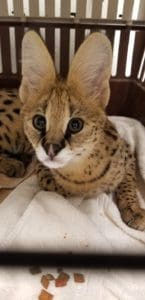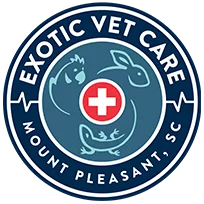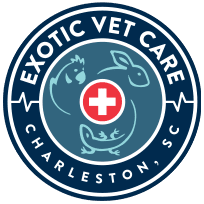 Captive exotic felids are obligate carnivores and require a balanced diet to ensure proper nutrition which meets both metabolic energy demands and provides sufficient vitamins and minerals to promote proper growth and health. There is little information available on nutrition of specific wildcat species, however, generalizations can be made for most species.
Captive exotic felids are obligate carnivores and require a balanced diet to ensure proper nutrition which meets both metabolic energy demands and provides sufficient vitamins and minerals to promote proper growth and health. There is little information available on nutrition of specific wildcat species, however, generalizations can be made for most species.
A diet must ideally include muscle meat as a source of energy and protein, bone for calcium, and internal organs for vitamins and minerals (liver for example is a rich source of vitamin A). The most common nutritional deficiency observed in captive exotic carnivores is calcium deficiency leading to metabolic bone disease/nutritional secondary hyperparathyroidism. This is a metabolic disorder where chronic calcium deficiency in the diet causes excess production of parathyroid hormone, which keeps blood calcium levels normal at the cost of bone calcium, leading to fragile bones. Clinically, patients with calcium deficiency can display signs of deficiency of circulating calcium including tremors and muscle weakness, and even seizures. Chronic deficiency leading to fragile bones and in small wildcats especially, acute lameness or paresis of the back legs from spinal trauma due to fragile bones in in the spine. Folding fractures or bending/bowing of bones in the ribs and legs is also possible in young growing cats (rickets/osteomalacia). Calcium deficiency is most dangerous in young, growing patients where calcium demands are constantly high due to new bone formation.
Taurine deficiency is another concern for captive carnivores. If chronic, dilated cardiomyopathy, a fatal stretching and enlargement of the heart, can occur.
With all pets on non-traditional diets, I do recommend that consultation with a veterinary nutritionist to balance long term nutritional needs may be beneficial. Veterinary nutritionists are specifically trained as specialists in the nutrition of cats and dogs, and know how to create safe balanced diets for long term health. Although nutrition may sound simple in theory, it can be very complex when attempting to balance different vitamins and minerals long term in a diet. Consults can generally be done by phone and generally have a fee associated with the nutritionist creating a full diet plan for the individual pet. Cornell has a service which I have worked with in the past and found to be very good (https://www.vet.cornell.edu/hospitals/services/nutrition)
The amount of any diet being fed depends in part upon the energetic needs of the individual pet. Pet wildcats are extremely prone to obesity, as they get high-nutrient diets with little effort (there is no stalking and hunting quarry, and their “home ranges” are quite small inside the home compared to in the wild). This is where consultation with a veterinary nutritionist can be quite beneficial. For kittens, about 15-20% body weight in diet per kitten is about right—so 450-600g of diet per 3 kg kitten (this amount of food will increase as they grow in body weight). Tracking the weight of captive carnivores long term is extremely beneficial. Kittens should be constantly gaining weight and weight loss is concerning. Adult cats should not be gaining weight and should be fairly stable in their weight…a significant gain or loss is concerning.
There are many unusual rumors and suggestions on diets among owners and breeders of captive wildcats. Oatmeal especially is a common inappropriate suggestion and has absolutely no place in a captive exotic carnivore’s diet. A captive wildcat’s diet should be entirely meat based but balanced for proper energy and nutritional needs.
For feeding captive exotic carnivores, there are several options for diets, including:
- Whole prey item based diet (frozen raw)
- Premade vitamin/mineral enriched meat diet (frozen raw, kibble, canned)
- Home mixed vitamin/mineral supplementation of raw meat diet
Whole prey item based diet
The ideal diet for captive exotic carnivores is whole prey items, as this most closely mimics what they would eat in the wild. Whole food items have a proper calcium to phosphorous ratio and good levels of vitamins and minerals. When whole prey items are fed, there should be a rotation of the type of prey being fed. For example, whole day old chicks one day, quail another, followed by rat, mice or guinea pig. They need to be safely sourced from a facility that breeds healthy rodents or birds for feeding. There are many such facilities and companies. Understandably, this may not be possible or palatable for all homes. Occasional treating of mice or frozen chicks is still recommended even if not used as the base of the diet to provide mental stimulation (prey items are much more exciting than plain meat).
Day Old Chicks (cockerels): http://chickenhawkfood.com/
Quail: http://www.jasonsquailcompany.com/ https://johnsonquail.com/
Rats/mice/guinea pigs: https://www.rodentpro.com/ https://micedirect.com/
Premade vitamin/mineral enriched meat diet
If whole prey items cannot be fed, the next safest choice is to use a pre-formulated diet. There are several companies who are well-trusted in the nutrition of captive exotic carnivores and their diets have been used long enough that mineral and vitamin balances have been shown to be adequate for the cats on these diets. For most of the companies a nutritionist has aided in the creation of these diets. A raw frozen diet, kibble diet, or canned diet are all acceptable. A mix of these can be used if the cat finds them to be palatable. Importantly, these diets include proper calcium levels and taurine.
Triple A Meat Company Feline Complete Diet: http://tripleabrandmeatcompany.com/product.html
Nebraska Brand Carnivore Diets: http://www.nebraskabrand.com/products.htm
This is a dry product by Mazuri: https://www.mazuri.com/mazuri/exotic-mammals/exotic-feline/exotic-feline-small
And a canned product by ZuPreem: https://zupreem.com/zoo-animals/exotic-feline/
Home mixed vitamin/mineral supplementation of raw meat diet
If neither a whole prey item based diet or a premixed diet are used and raw muscle meat and organs are used as the base of the diet, minerals and vitamins must be added to the diet. Plain organ and muscle meat fed long term will lead to chronic nutritional imbalances. There are several different supplements available which are produced by reputable companies.
Nebraska Brand “Meat Complete with Taurine” (they also sell carnivore diets): http://www.nebraskabrand.com/docs/meatcompletesheet.pdf
Mazuri Carnivore Supplement for Slab Meat:
https://www.mazuri.com/mazuri/tablets-gels-other-supplements/carnivore-supplement-for-slab-meat
To supplement calcium into a raw meat diet, 5 grams calcium carbonate per lb of meat/organ can be fed. Long term, the above supplements are preferred as they include calcium and taurine, but calcium carbonate is available over the counter from drugs stores.
Taurine can be supplemented at 250 mg per day into the meat being fed. Again, this is available over the counter. If a complete supplement is used, it does not need to be given separately.
Overall, usage of all three categories of food is fine and use of category 1 (whole prey items) is strongly recommended, even if only given as treats due to benefit from both strong nutrition and mental stimulation from the prey item.
When handling raw food items it is important to slowly thaw food items (place from freezer into refrigerator the day before) and to ensure that any containers used to thaw food items are regularly cleaned. When handling raw foods, ideally a set of prep items should be dedicated to the pets food (ie a specific cutting board and knife, bowl, etc) and should not be used for humans. Hands should be thoroughly washed both before and after food preparation. Raw food items always carry a potential risk for human illness if not handled properly as bacterial contamination is common even in very cleanly prepared meat (hence recommendations even for human chicken products to be very careful with handling). Specifically, handling of raw poultry carries a risk of Salmonella infection, and E. coli and other gram negative bacteria can be contaminants of meats in general. If a person in the household is immune compromised they should not handle raw food items. Any utensils or prepping surfaces coming into contact with raw food should be thoroughly disinfected and dried before their next use.

About Us
Our exotic animal hospital is dedicated exclusively to the care of birds, exotic small mammals, reptiles, and even fish! We can offer everything your pet needs for a healthy and happy life, from wellness care and grooming to diagnostics and dentistry, but we can also provide emergency care during our opening hours, along with more specialized treatment for referred patients.
